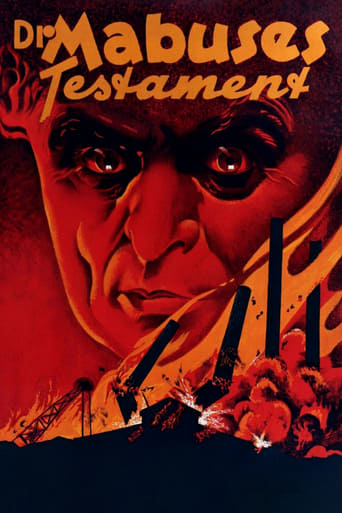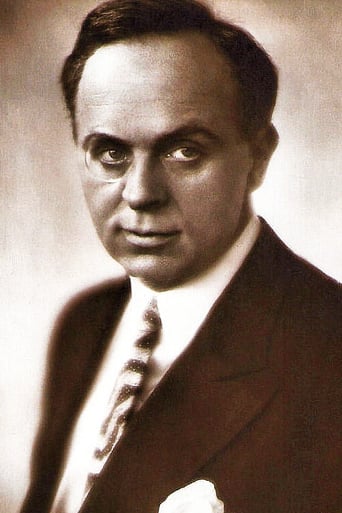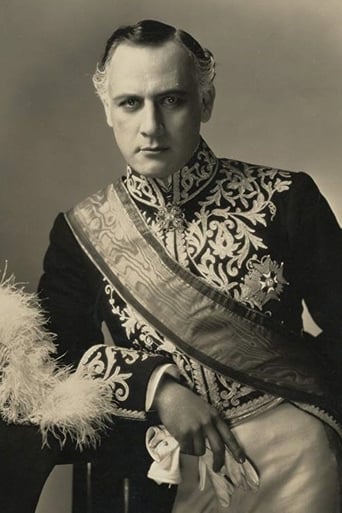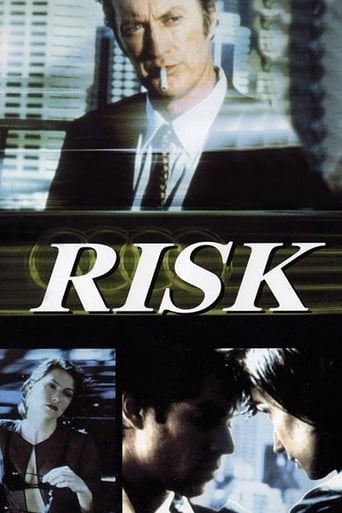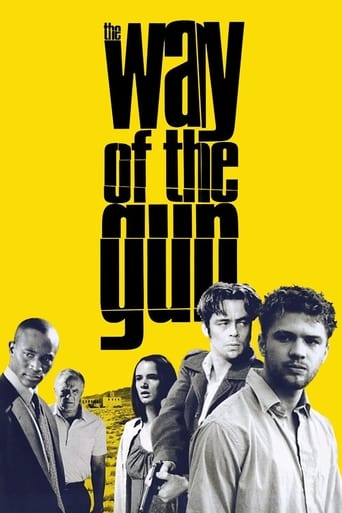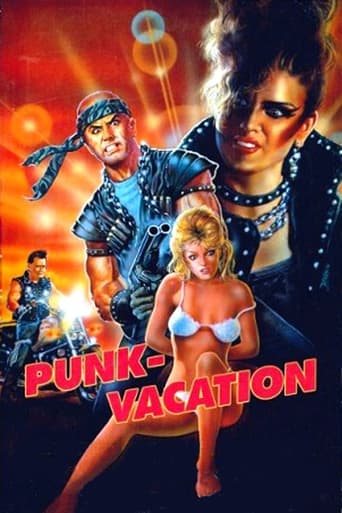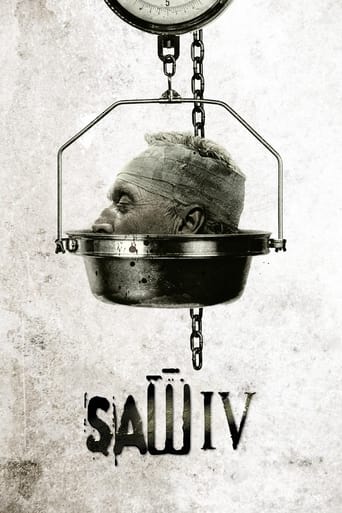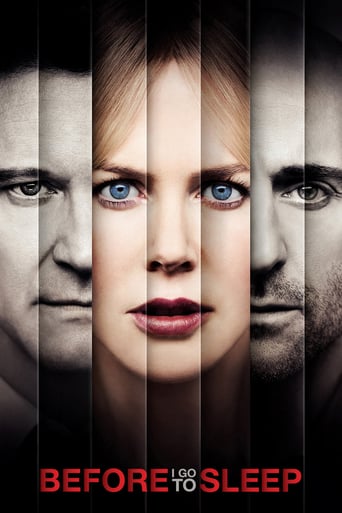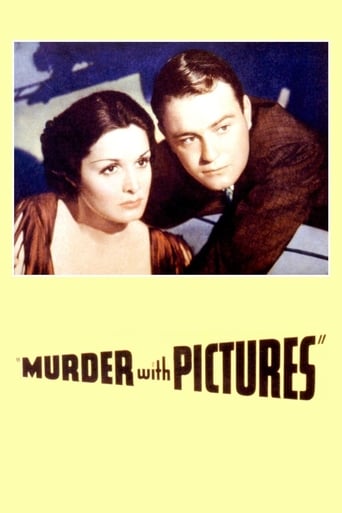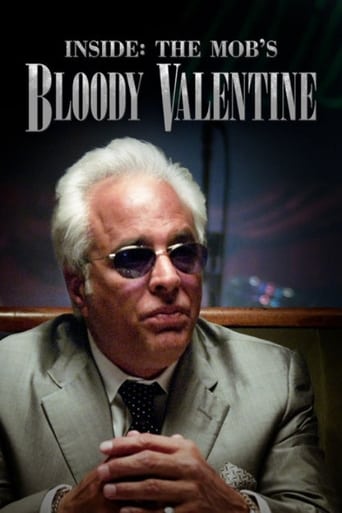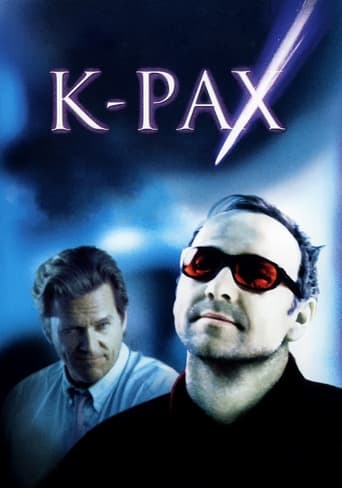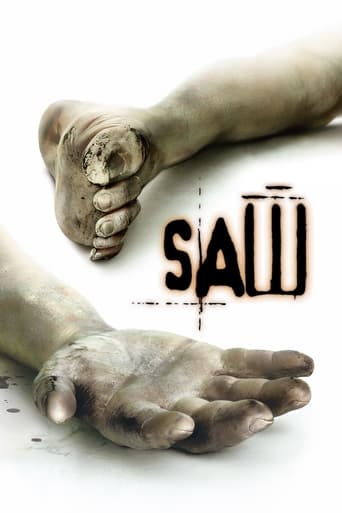The Testament of Dr. Mabuse (1943)
After a detective is assaulted by thugs and placed in an asylum run by Professor Baum, he observes the professor's preoccupation with another patient, the criminal genius Dr. Mabuse the hypnotist. When Mabuse's notes are found to be connected with a rash of recent crimes, Commissioner Lohmann must determine how Mabuse is communicating with the criminals, despite conflicting reports on the doctor's whereabouts, and capture him for good.
Watch Trailer
Cast


Similar titles
Reviews
Disappointment for a huge fan!
There are better movies of two hours length. I loved the actress'performance.
It's funny, it's tense, it features two great performances from two actors and the director expertly creates a web of odd tension where you actually don't know what is happening for the majority of the run time.
It is neither dumb nor smart enough to be fun, and spends way too much time with its boring human characters.
Those who have never seen this truly bizarre thriller have been missing a rare treat. Yes, it was made way back in 1933. Yes, it is is black-and-white. Yes, it is in German, with subtitles. Don't allow any of that dissuade the viewer, because "The Testament of Dr. Mabuse" remains among the most bizarre and original thrillers ever filmed. Over the decades so many elements from this amazing film have been copied by other filmmakers that it would take far too long to enumerate them here. However, watch this movie and I'm sure you'll have no trouble spotting a dozen examples or so without too much trouble.The story involves a crime wave in a German city that may, or may not, be controlled by an insane criminal mastermind who, for the past ten years, has been existing in a catatonic state in an insane asylum (they used to call them that in those days). Viewers who considered Terry Gilliam's "12 Monkeys" to be really original and bizarre will be astounded at just how far ahead of his time Fritz Lang actually was.In addition there were serious political overtones to "The Testament Dr Mabuse". Whether those political overtones were intentional or not is still a matter of debate. However, there is no question that the idea of a movie about a mad criminal genius assuming power was not lost on Adolf Hitler's Nazi regime, which assumed power in Germany the very same year this movie was produced. The result was that the movie was immediately banned in its home country and Fritz Lang had to make a hasty departure for Hollywood. For that reason alone this movie would be worth seeing, even it were not as remarkable a piece of film- making as it is.
I'm sadly not an expert on director Fritz Lang's life and wondrous film repertoire, but I read somewhere that the original 1922 "Dr. Mabuse, der Spieler" was like a metaphor for everything that went wrong in contemporary Germany, what with its decadence and corruption. Eleven years later, the Nazi party had risen to power, and the notorious (and nefarious) Joseph Goebbels single-handedly decided that the follow- up "The Testament of Dr. Mabuse" should be banned from the public. Ironically enough, the same Joseph Goebbels almost simultaneously offered Fritz Lang to become manager of the German Film Institute. According to the legends, Lang suspected that it was some kind of ambush and fled the country overnight. I don't know if the whole story is true, but it's definitely fascinating! The film itself is truly a must-see for cinema fanatics and historians, although I have to admit it is a very complex and demanding movie to watch. It's a genuine crime thriller, albeit with unmistakable horror aspects. Vile crimes are being committed all over the city and all traces lead back towards the infamous Dr. Mabuse. One minor little problem, however, Dr. Mabuse resides in a hermetically sealed off cell in a mental institution. But like his obsessive fan Dr. Baum proclaims in all his lectures, Mabuse is a true genius that even masters the art of hypnosis. Could it be that he is mind-controlling his minions all of town in order to commit his crimes? Commissioner Lohmann, the same cop who chased presumed child murderer Peter Lorre two years earlier in "M", is in charge of the investigation. Certain sequences in "The Testament of Dr. Mabuse" are incredibly tense and petrifying, like for example when the sinister doctor appears and disappears like a ghost. Other scenes, particularly the crime sequences, are very intelligent and utmost ingenious! For example, I'll probably never forget the scene where the targeted victim of a murder is driving his car and stopping at the red light. His killer, in one of the cars next to him, evokes a series of honking among all the cars in front of the red light and even the targeted victim joyously joins the honking concert. Then, with all the noise of the honking, the killer can inconspicuously pull the trigger of his shotgun and nobody noticed the loud blast. Only when the light switches back to green and all the other cars are long gone, a policeman discovers the lifeless body behind the wheel. Rudolf Klein-Rogge doesn't have a whole lot to do, in fact, but performance as the titular Dr. Mabuse still stands as one of the most legendary villainous characters of all time. The film is a technical and visual masterpiece that still also carries a lot of trademarks and atmospheric characteristics of the silent era with it. Truly unique cinematic heritage
This film was famously banned by the nazi party, and Lang beat a quick retreat from Berlin after hearing the news. To some extent we can see why -- the film depicts a criminal gang, run by a ruthless maniac who wants to use industrial terrorism to strike fear into the population and ultimately gain control. Sounds familiar? I guess Goebbels thought so too.It's an interesting film, poised as it is partway between his silent career and his future talking film career in America. The film features a recurring character (Commissioner Lohmann) from his previous masterwork "M", and also the same kind of fascination with technology that was present in the first "Mabuse" film and in "Spies" and "Metropolis." This would show up less frequently in his American films, but "Cloak and Dagger" certainly is brethren to this film. It also features some really startling car chases that are a more elaborate version of what he had done in "Metropolis." Some of his expressionist devices are quite startling, especially Mabuse as a ghost with his huge pale eyes, and the way Dr. Kramm's (Theodor Loos) head is framed against the rushing trees almost looks as if we're seeing inside the fabric of his brain. The film also shows up Lang's weaknesses, specifically his inability to make the "heroic" characters in the film convincing or two- dimensional. Gustav Diessl is barely adequate as Tom Kent, whose name is as dull and straightforward as his character, and Wera Liessem's Lilli, the love interest, is a study in poor acting and stale characterization. But the film's a winner, because even all these many years later you are sure to see something that you've never seen before in a film. Lang's visual sensibility and his excellent editing move the film forward like a mack truck. Klein-Rogge is as chilling and otherworldly as ever, and his criminal madman in an asylum was surely an inspiration for many future film villains right up to the present day (some of his lines of dialog were clearly lifted for Nolan's "Dark Knight"). I think the film is slightly unbalanced by the policeman (Otto Wernicke) being given more screen time than either Mabuse or the ostensible hero of the film, but why quibble? It's stood the test of time and will surely be thrilling people when a lot of the big blockbusters of our day have been forgotten.
Like the other films of Friz Lang, this is an authoritarian movie. When you watch a film noir from the Hayes code era you get the same idea. But not as strong. Yet Germany did not have a Hayes code. When in States that was imposed, the studios wanted to comply. In the case of Lang this is no compliance. This is his wish. His dream world.Maybe Lang was just depicting the German society in Berlin those days. But I can't help remarking the irony of the compatibility between his artistic expression and the Germany wanted by the Nazi. Of the stupid detail standing between them: Lang's grandparents. If they were anything but Jewish, maybe Lang would have shot the Triumph of the Will.Contact me with Questions, Comments or Suggestions ryitfork @ bitmail.ch

